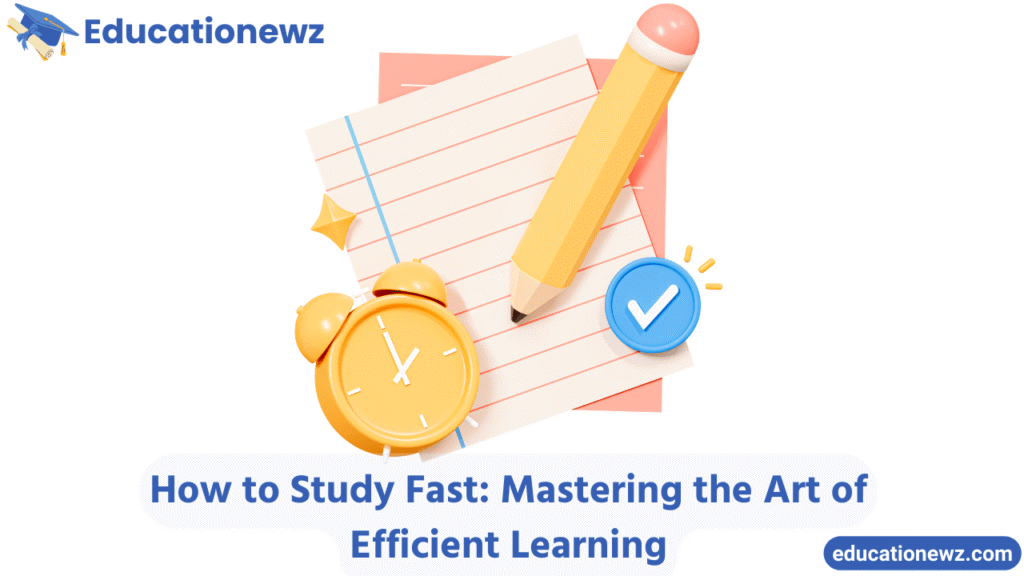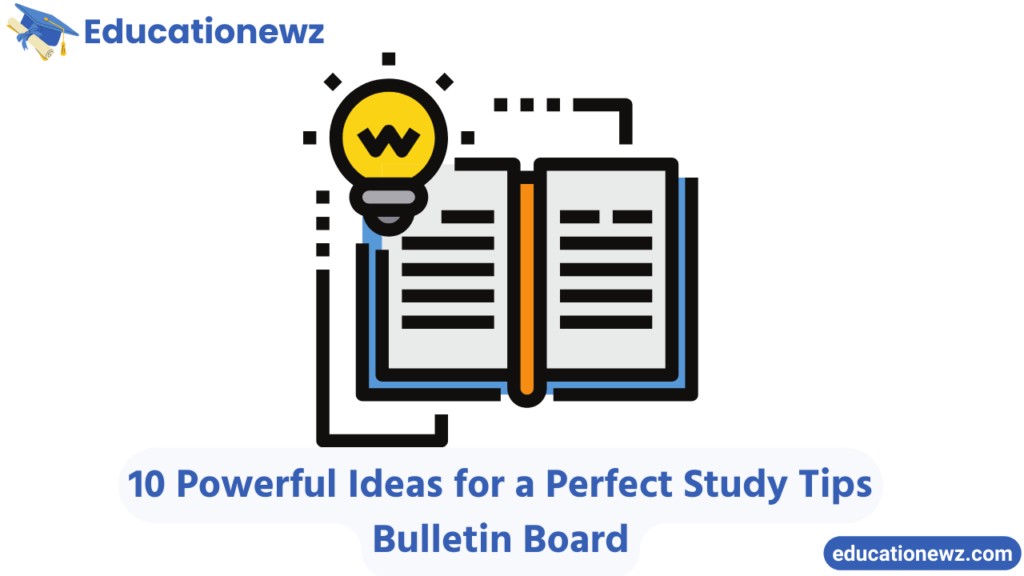Learning how to study fast involves using focused strategies, minimizing distractions, and adopting efficient techniques to save time, enhance retention, and achieve better results in less time.
In today’s fast-paced world, learning efficiently is more critical than ever. Whether you’re preparing for exams, gaining new skills, or managing a tight schedule, mastering the techniques to study fast can make all the difference. This article provides practical strategies to enhance your learning speed without compromising comprehension. By the end, you’ll have actionable tips to optimize your study sessions for maximum productivity.
Why Learning to Study Fast is Important
Time is a finite resource, and juggling academic, professional, and personal commitments can leave little room for thorough study sessions. Learning how to study fast is essential not just for saving time but also for improving focus, retaining information better, and reducing stress. Efficient study techniques empower individuals to tackle complex subjects in a fraction of the time, giving them an edge in meeting deadlines, acing exams, and achieving their personal or professional goals. Moreover, by optimizing your study process, you can create more opportunities to explore hobbies, network, or simply relax without compromising on results.
Fast studying is particularly crucial in today’s world of information overload, where new skills are often required to stay relevant. By understanding and practicing efficient learning methods, you can maintain a competitive edge while maintaining a healthy balance between productivity and mental well-being.
Key Strategies to Study Fast

1. Set Clear Goals Before You Start
A productive study session begins with a clear objective. Define what you aim to achieve before sitting down to study. Whether it’s mastering a chapter, solving 10 practice problems, or understanding a concept, having a specific goal keeps you focused and prevents wasted time.
Steps to Set Effective Goals:
- Write down your study objectives.
- Break large tasks into smaller, manageable chunks.
- Prioritize tasks based on deadlines and importance.
For example, if you’re preparing for an exam, start with topics you find challenging. This ensures that you tackle complex areas when your mind is fresh.
2. Use Active Learning Techniques
Active learning engages your brain and improves retention. Instead of passively reading or highlighting text, interact with the material. This method saves time and ensures you truly understand the content.
Examples of Active Learning Techniques:
- Summarize each paragraph in your own words.
- Create flashcards for quick reviews.
- Teach the topic to someone else or imagine you’re explaining it.
Active engagement accelerates your learning process and builds long-term memory, a vital aspect of studying fast.
3. Apply the Pomodoro Technique
The Pomodoro Technique is one of the most effective time management methods for studying. This method divides your study time into intervals (usually 25 minutes) with short breaks in between.
How It Works:
- Study for 25 minutes.
- Take a 5-minute break.
- Repeat the cycle four times, then take a longer break (15-30 minutes).
This technique helps maintain focus, prevents burnout, and enhances productivity. Regular breaks rejuvenate your mind, making subsequent study sessions more effective.
4. Prioritize the Hardest Topics First
Starting with the most challenging subjects when your mind is at its peak energy ensures better understanding and retention. As you progress, the easier tasks will seem less daunting.
Benefits:
- Maximizes your mental resources.
- Reduces procrastination by tackling difficult tasks early.
- Boosts confidence as you overcome tough challenges.
Create a study schedule that aligns with your energy levels to optimize this strategy.
5. Leverage Visual Learning Tools
Visual aids like diagrams, flowcharts, and mind maps simplify complex information. They make learning faster by presenting key concepts in a structured, easy-to-digest format.
Examples of Visual Tools:
- Mind maps to connect related ideas.
- Flowcharts to understand processes or sequences.
- Color-coded notes to differentiate key points.
For instance, when studying biology, a flowchart can quickly summarize processes like cellular respiration, saving time compared to reading lengthy paragraphs.
6. Practice Retrieval Learning
Retrieval learning involves recalling information from memory rather than rereading or reviewing it. Testing yourself frequently is one of the most effective ways to enhance memory and understanding.
Methods:
- Use practice tests.
- Write answers without looking at your notes.
- Discuss the topic with peers or mentors.
This technique strengthens neural pathways, helping you retrieve information faster during exams or practical applications.
Quick Hacks to Boost Study Speed

1. Eliminate Distractions
Distractions are the enemy of efficient studying. A distraction-free environment enhances focus and drastically cuts down the time it takes to grasp a topic.
Actionable Tips:
- Turn off notifications on your devices or enable “Do Not Disturb” mode.
- Use noise-canceling headphones to block out ambient sounds.
- Find a quiet, dedicated study area free from interruptions.
Even small changes like decluttering your desk can significantly boost your concentration.
2. Optimize Your Study Environment
Your study environment has a profound impact on your productivity. An organized, well-lit, and comfortable setting reduces mental fatigue and keeps you motivated.
How to Optimize:
- Ensure your desk is clutter-free and has all the materials you need.
- Use natural lighting or bright, warm lamps to avoid eye strain.
- Adjust your chair and desk to maintain a comfortable posture.
A tailored environment can help you stay focused longer and reduce the time wasted on unnecessary adjustments.
3. Take Smart Notes
Efficient note-taking is a game-changer for quick studying. Well-structured notes condense critical information, making revisions faster and more effective.
Proven Note-Taking Methods:
- Use the Cornell Note-Taking System, which organizes notes into summaries, cues, and main content.
- Highlight key concepts with abbreviations, bullet points, and color coding.
- Include visual elements like charts or diagrams for complex topics.
Well-prepared notes reduce the time spent searching for information and improve retention during quick reviews.
ving time during revisions. Use methods like the Cornell Note-Taking System or highlight key points with abbreviations.
Study Techniques Comparison
| Technique | Benefits | Best For |
|---|---|---|
| Pomodoro Technique | Prevents burnout, maintains focus | Time management |
| Active Learning | Improves retention | Understanding complex topics |
| Visual Tools | Simplifies information | Complex processes |
| Retrieval Practice | Enhances memory recall | Exam preparation |
The Role of Healthy Habits in Studying Fast

1. Sleep Well
Sleep is crucial for memory consolidation. Without adequate rest, your brain struggles to process and retain information. Aim for 7-9 hours of quality sleep each night to maximize learning efficiency.
2. Stay Hydrated and Eat Healthy
Proper hydration and a balanced diet fuel your brain, improving focus and energy levels. Avoid heavy meals before studying as they can make you lethargic.
3. Exercise Regularly
Physical activity enhances brain function by increasing blood flow and oxygen supply. Incorporating even 20 minutes of exercise into your daily routine can significantly boost your cognitive abilities.
FAQs: Answering Common Questions on How to Study Fast
1. What is the best time to study fast?
The best time to study is when you feel most alert. For many, this is early in the morning or late at night when distractions are minimal.
2. Can I really improve my study speed?
Yes, with consistent practice and the right techniques, anyone can improve their learning efficiency.
3. How do I remember what I studied quickly?
Techniques like retrieval practice, summarizing, and visual tools help improve memory retention.
4. How long should I study each day?
This depends on your goals. Using the Pomodoro Technique, aim for 4-6 focused hours daily with breaks.
5. Does multitasking help in studying fast?
No, multitasking divides your attention and reduces productivity. Focus on one task at a time for the best results.
Conclusion
Mastering the art of how to study fast requires a combination of discipline, effective techniques, and healthy habits. By setting clear goals, using active learning, and optimizing your environment, you can significantly boost your study efficiency. Remember, the key is not just to study quickly but to retain what you’ve learned. Implement these strategies consistently, and you’ll find yourself achieving your academic and personal goals faster than ever before. Please follow our blog Educationewz.



